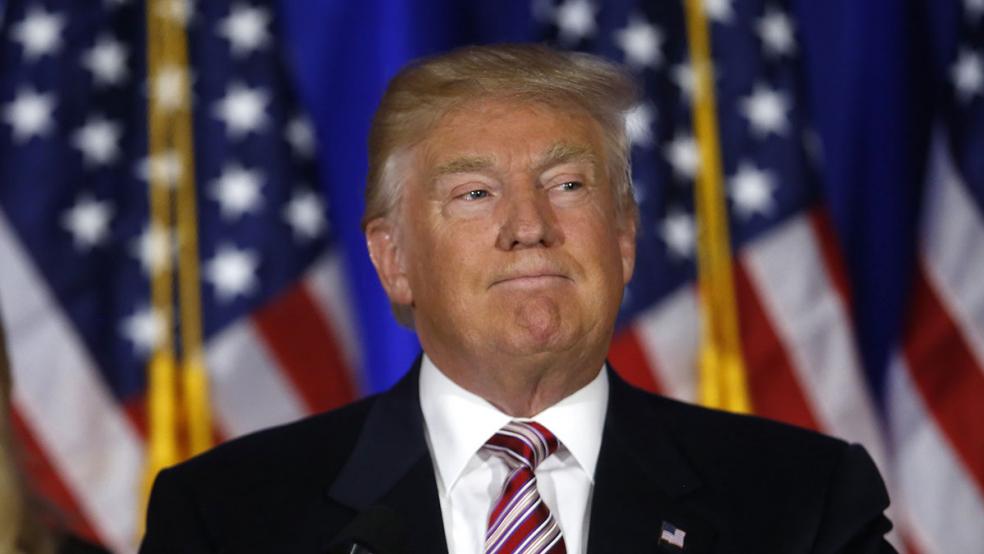There’s an obvious effort underway within the Republican Party to civilize Donald Trump, or at least to drag him into compliance with the most basic norms of first-world political discourse. It may or may not be successful in the end, but either way, it bodes ill for the Republican Party in the coming election because of the way Trump has engineered his primary success.
Barring a seismic shift in the GOP nominating process, the man who will carry the party’s banner into November won by appealing to the grievances of a segment of the party that is generally older, whiter, and less educated than the rest of the Republican electorate.
Related: Trump Really Did Energize the GOP Vote -- Here’s the Proof
“The only way Trump can win is to expand beyond the base he’s got now,” said former Oklahoma Congressman Mickey Edwards, a longtime Republican who was a founding trustee of the Heritage Foundation.
But that will be tricky, because one of the things that endears him to his most ardent supporters -- a willingness to pick at the scabs of racial and ethnic resentments -- is precisely what’s keeping him from winning broader support.
Trump’s recent attacks on the integrity of a federal judge, based on the man’s Mexican heritage, seemed to trip a final circuit breaker for many in the GOP, like South Carolina Sen. Lindsey Graham, who this week said that he cannot vote for Trump and called on other Republicans to rescind their existing endorsements of the party’s presumptive presidential nominee.
Team Trump appears to recognize that it needs not only its existing support, but also the support of Republicans made deeply uncomfortable by Trump’s rhetoric. So far, the campaign hasn’t found a way to thread that needle.
Related: Trump’s Next Obsession -- Bill Clinton and Laureate Universities
The tension was on vivid display after the final Republican primaries concluded Tuesday, when Trump appeared at one of his golf resorts in suburban New York and delivered an uncharacteristically scripted and sedate victory speech that was notably lacking attacks on Hispanics, Muslims, and other minorities.
As Peter Dreier, the E.P. Clapp Distinguished Professor of Politics at Occidental College put it, “The dilemma for Trump is that the speech was incredibly boring. It didn’t even excite the hand-picked crowd at the golf club.”
Republican strategist Ford O'Connell agreed that the event was not Trump's best moment. "Trump's supporters like him not because they agree with all of his positions but because of what he represents, which is a giant middle finger to the establishment wing of the GOP and to DC politics as usual. For Trump to succeed in this election he doesn't need to be as scripted and subdued as he was in Tuesday night's speech. In fact, Trump can be as outspoken and colorful as he wants so long as he stays 'on message.'"
And while that message includes attacking presumptive Democratic nominee Hillary Clinton and telling GOP voters how he plans to improive their lives, O'Connell added, "He does not need to go down rabbit holes after federal judges or airing personal grievances that are not related to [those] two items."
But that’s the trouble with trying to civilize Trump, said Larry Sabato, director of the University of Virginia’s Center for Politics. “Trump is a wild horse who cannot be tamed. He doesn't want to be tamed and has the wrong genetic code to be reprogrammed,” Sabato said, adding, “The very notion that Trump will become ‘presidential’, whatever that is,” is laughable.
And the more Trump tries to run toward the center, the more he risks alienating the people who helped him secure the nomination in the first place. If he continues to bow to demands from the GOP establishment and some of his more conventional advisers to tame his rhetoric, Sabato said, “It won't be long before his cult of supporters, who love the un-PC version, will demand, ‘Let Trump be Trump!’”
Related: Trump Tries to Behave, but Needs Another Time Out after Hannity Interview
This is potentially a real problem for the GOP nominee. Given the demographic makeup of the US electorate, which offers Republican presidential candidates a handful of real, but narrow, paths to the White House, voter turnout is an essential component of any successful White House bid.
But the support Trump has tapped into comes in large part from voters who feel that they have repeatedly been betrayed by leaders of the Republican Party – and the federal government in general. Any hint from Trump that he is not as authentic a voice as they hoped could dampen the enthusiasm he needs to drive voters to the polls in November.





